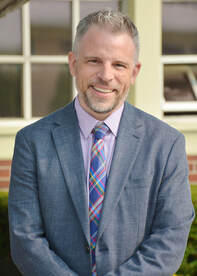Welcome to
Elmwood Franklin School!

Upon my first visit to Elmwood Franklin School, it was immediately clear to me that EFS is an intentionally caring and inclusive community of families, students, teachers, staff, and alumni who share ideas, value and affirm differences, and work in partnership to create an outstanding environment for our students to learn and grow. This incredible community's hard work and commitment have firmly established EFS as the premier independent preschool to eighth-grade school in the city of Buffalo.
EFS balances its rich and storied tradition with a 21st-century approach to teaching and learning. The school's comprehensive academic program, led by our top-notch faculty, is paired with a strong emphasis on citizenship and good character. Curiosity is rewarded, risk-taking is encouraged, and challenging assumptions is expected. As a result, our students graduate as confident, resilient, independent thinkers. I am reminded of Dr. Martin Luther King's quote, "The function of education is to teach one to think intensively and to think critically. Intelligence plus character—that is the goal of true education." I am proud to be a part of a school community that fully embodies this idea.
Whether you are a prospective family, a current family, or an alum, there is always something to learn about our amazing school. This includes everything from the admissions process to our educational philosophy to school life, supporting the school, and following us on social media: Facebook, Twitter, Instagram, and YouTube.
I invite you to visit our campus in person to learn more about or re-discover what it means to be part of the Elmwood Franklin community. And if you are already a part of our wonderful community, I thank you for your support!
Warmly,
EFS balances its rich and storied tradition with a 21st-century approach to teaching and learning. The school's comprehensive academic program, led by our top-notch faculty, is paired with a strong emphasis on citizenship and good character. Curiosity is rewarded, risk-taking is encouraged, and challenging assumptions is expected. As a result, our students graduate as confident, resilient, independent thinkers. I am reminded of Dr. Martin Luther King's quote, "The function of education is to teach one to think intensively and to think critically. Intelligence plus character—that is the goal of true education." I am proud to be a part of a school community that fully embodies this idea.
Whether you are a prospective family, a current family, or an alum, there is always something to learn about our amazing school. This includes everything from the admissions process to our educational philosophy to school life, supporting the school, and following us on social media: Facebook, Twitter, Instagram, and YouTube.
I invite you to visit our campus in person to learn more about or re-discover what it means to be part of the Elmwood Franklin community. And if you are already a part of our wonderful community, I thank you for your support!
Warmly,
Dr. Ryan Kimmet
Head of School
Head of School

